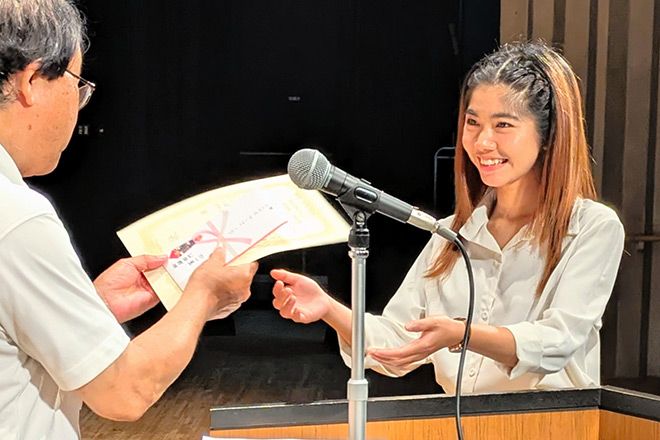International students have become a familiar sight in Japan, staffing convenience stores and restaurants in cities nationwide.
Yet, the personal stories behind their journeys—the hardships, small victories and ambitions they carry—are seldom heard.
That silence contrasts with a striking figure: the number of international students enrolled in Japanese-language schools topped 100,000 for the first time in the last fiscal year, according to a recent survey by the Japan Student Services Organization (JASSO).
Each statistic hides an individual path, often defined as much by struggle and resilience as by hope.
Some of those stories reached an Osaka audience in early September, when young men and women from across Asia and beyond shared snippets of their lives at a Japanese-language speech contest.
In Osaka’s Higashinari Ward, a densely populated district known for its working-class character, Ebisu Japanese Language School stands just a short walk from JR West’s Tamatsukuri Station on the Osaka Loop Line.
When it opened in 2019, the school welcomed only two students. Today, more than 260 fill its classrooms. Most enrolled are in their late teens to early 20s, with the largest groups hailing from China, Myanmar and Nepal.
The school’s annual speech contest on Sept. 8 brought that diversity to life as a local community hall rang with cheers, whistles and shouts of encouragement. Sixteen contestants, each chosen to represent their respective classes, stepped onstage to share their stories.
For many overseas students, the greatest obstacle in Japan remains the language itself. However diligently they may have studied back home, the Japanese they encounter in daily life is rarely the language of textbooks—and the added challenge of regional dialects only deepens the gap.
Ei Zin Phyo, a young woman from Myanmar who enrolled at the language school in April, began working part time at a restaurant almost as soon as she arrived in Japan.
“The customers spoke so quickly I couldn’t catch what they were saying, and my senior colleagues scolded me again and again for not handling things properly,” she recalled. “Sometimes I even cried on the way home.”
One day, however, a Nepali co-worker offered a few simple words of comfort: “I went through the same thing, you know.”
For Ei Zin Phyo, that moment of empathy “made my heart suddenly feel light.”
Realizing she wasn’t alone in her struggle gave her the resolve to keep going. Over time, the reprimands faded, replaced by words of praise from her colleagues.
“True strength is not about never crying,” she told the audience. “It’s about having the courage to ask for help when times are hard, and the resilience to rise again after failure.”
Her goal, she added, is to study at a national university in Japan.
NEW CHAPTERS AND INTERESTS
Not all the speeches were solemn. Another student from Myanmar recounted her bewilderment at the maze of buttons on a Japanese toilet, and how in her early days she answered every remark with a simple “hai, hai”—a phrase that can mean “yes,” “that’s right,” or simply “I hear you.”
When one of the judges advised her to stop saying “hai” to things she didn’t actually understand, she responded with yet another cheerful “hai!”—sending the hall into laughter.
Behind the laughter, however, lay a sobering truth. Ongoing turmoil in Myanmar—including forced military conscription and the suppression of citizens—has driven many young people abroad in search of work or study.
One male student from the troubled Southeast Asian nation admitted he had been forced to withdraw from his university without a diploma and give up hopes of employment at home.
His conclusion was stark: “I decided not to chase my dreams anymore.”
Nepal, now one of the largest sources of Japanese-language students alongside China, also had its voices heard. Nepali Bal Bahadur spoke of the devastating loss of a friend killed in a traffic accident in Japan.
For many international students, bicycles are an essential means of getting around. He used his speech to make a heartfelt appeal: “Please, always wear helmets. We are treasures to our families. Take care of yourselves.”
Vietnamese student Khuat Thi Thanh Huyen recalled how failing her high school entrance exam left her not only disappointed in herself but also feeling that she had let those around her down.
Unmotivated and adrift, she struggled to find direction—until a chance encounter changed the course of her life.
“One day I stumbled across Japanese anime,” she said. “I thought, this language is interesting.”
That spark of curiosity led her to begin studying Japanese, and eventually to Japan itself, where she spent four years as a nursing trainee. After returning home, she built a career as an interpreter and tour guide.
“People’s view of me changed,” she reflected. “Even I was surprised at what I could achieve professionally.”
Now she has set her sights on studying business at a Japanese university. To prepare, she enrolled at the Ebisu school in the spring.
“Learning is my purpose in life now,” she said with conviction.
Her path mirrors that of many others. According to JASSO, 80 percent of students graduating from Japanese-language schools in fiscal 2023 went on to pursue higher education in Japan, while another 10 percent entered the workforce here.


AloJapan.com